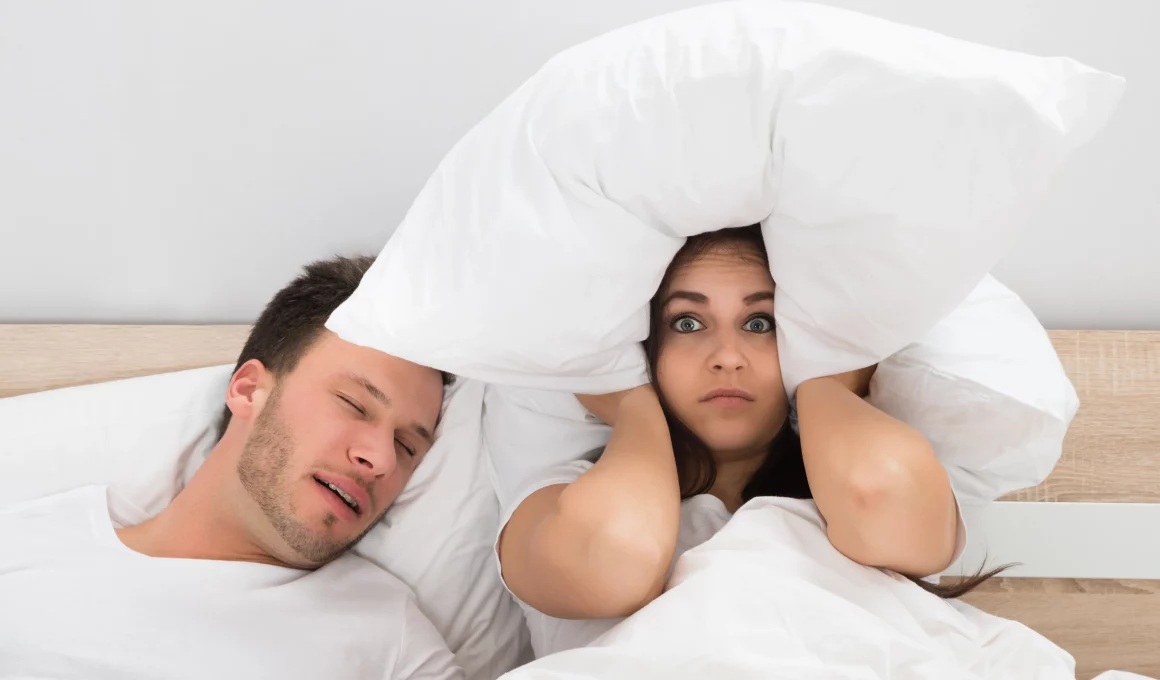The chances of finding a silent sleeper for life are slim: almost one in three Germans snores and often disturbs their bed partner’s sleep. In the following, we explain how snoring occurs, how dangerous it can be and what you can do about it.
What causes snoring?
Snoring is caused by the vibration of soft tissue in the throat when air flows past it at a relatively high speed. The soft palate in particular – a movable area on the upper palate at the end of which the uvula is located – starts to vibrate. This results in creaking, rattling and sawing noises.
A short lower jaw and large tonsils can also favour snoring. However, the problem can also lie in the nose. It can be narrowed because polyps grow on the nasal mucosa. Snoring can also be caused by a cold or a crooked nasal septum. Whatever is blocking your nose, it causes you to breathe through your mouth. If the tongue then slides back, the snoring spectacle begins.
The frequency of snoring increases with age, as the muscles and tissue in the throat become slack over the years. 60 per cent of all men and 40 per cent of all women over the age of 60 snore. Normal snoring is generally not harmful to health. Only two to eight per cent of Germans have dangerous breathing interruptions.
Only two to eight per cent of Germans suffer from sleep apnoea
Loud and irregular snoring is usually the first sign of sleep apnoea. The term apnoea comes from the Greek and means cessation of breathing. As sleep apnoea means that breathing does not work properly during sleep, those affected sleep poorly. Sleep apnoea can also lead to daytime sleepiness and can be the trigger for high blood pressure, heart failure, heart attacks and strokes.
If snoring is loud and regular and occurs in any position, a doctor should always be consulted. Sleep physicians are now able to recognise breathing disorders at an early stage. The earlier they are treated, the more successful the treatment usually is. This applies in particular to potentially life-threatening secondary diseases of sleep apnoea.
Risk factors for sleep apnoea include obesity, smoking, alcohol, allergies, deviated septum, an enlarged neck circumference and hypothyroidism.
What helps against snoring?
There is a huge selection of supposed miracle cures for annoying snoring: sprays, soothers and oils promise relief or even a solution to the problem. Many offers are expensive without necessarily helping the snorer.
However, there are also anti-snoring methods that may help to reduce the noise pollution to a more bearable level.
It is best to always go to bed at the same time – and neither hungry nor with a full stomach. The bedroom should be quiet, dark and cool. Alcohol, tranquillisers and sleeping pills should be avoided before going to bed – they further relax the muscles of the respiratory tract.
Changing your sleeping position is usually enough. If you lie on your back, there is a greater risk of your tongue and lower jaw slipping back. This blocks the airway. A neck support pillow could also improve the sleeping position. We offer you a comprehensive selection here.
If you snore because of a crooked nasal wall, nose clips can help. They widen the nostrils and make breathing easier. Your nose may also be blocked at night due to a house dust allergy. In this case, bedding with a filling made of synthetic fibres is advisable. The billerbeck range offers a variety of suitable products for house dust allergy sufferers in the fibre segment, e.g: Fibre duvet: CONCERTO, hygienic freshness thanks to the silver content incorporated in the filling, temperature and moisture balancing for exclusive sleeping comfort.
If none of this helps, more drastic measures against snoring should be considered: Doctors have invented lower jaw splints for persistent snorers. They are designed to stabilise the jaw. Under certain circumstances, the annoying night-time noise can also be stopped by surgery in severe cases. However, unless there is an important medical reason for an operation, surgery should always be a last resort.














